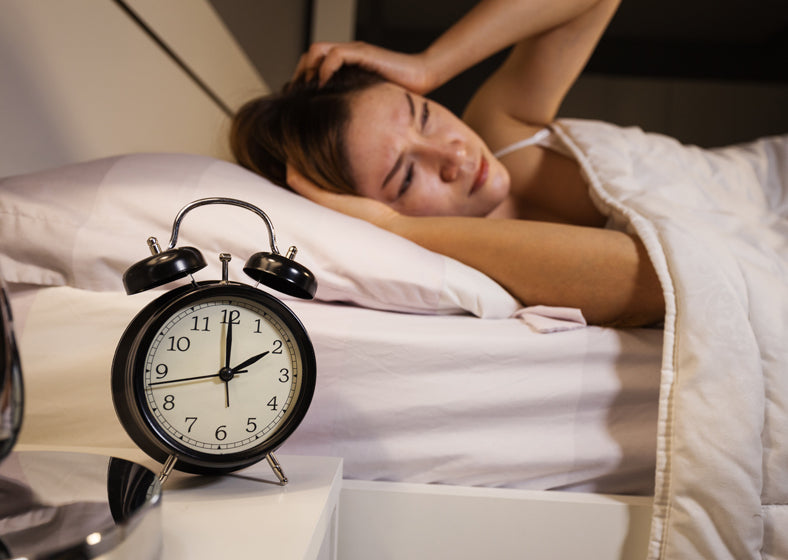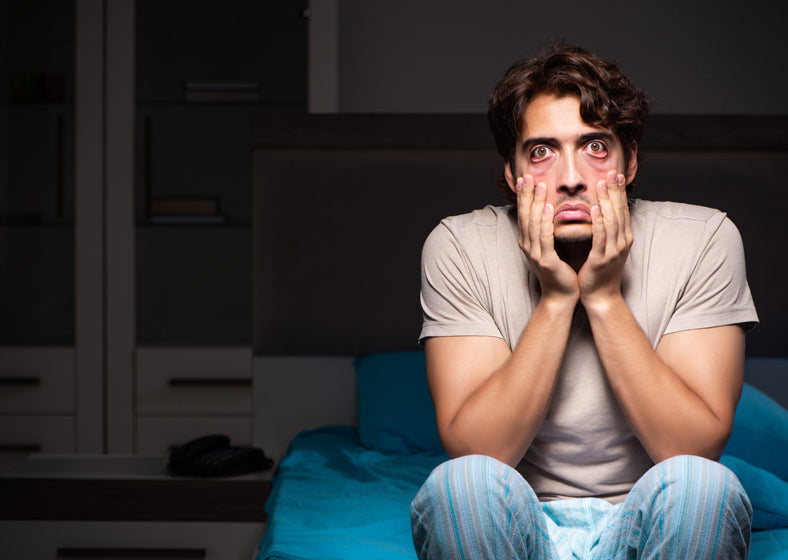No Products in the Cart
Last Updated October 10, 2025
 Fact checked by Kaneesha Allen
Fact checked by Kaneesha Allen
Kaneesha Allen, a registered nurse at St. Lucie Medical Center in Florida, holds certifications in ACLS, BLS, AMSN, and CMSRN from MSNCB. Known for her healthcare expertise and compassionate service, Kaneesha is also a contributor to Consumer Health Digest, utilizing her knowledge to inform and empower others in healthcare navigation. Read more
Every day, we remind ourselves to do various activities to maintain our health: exercise, eat well, drink water, etc. However, getting a quality night's sleep is not on the list for many people. Well, it ought to be. After a long day of work, the most beneficial thing you can gift your body and mind for recovery is sleep. It's the downtime your body requires to recover and perform better. Did you know that sleep deprivation can have long-term consequences? Yes, you heard it right!

As author Olive Green once put it, "It's no surprise Sleeping Beauty looked so good. She slept for long periods, never got older, and didn't have to work hard but only snore to attract her Prince Charming."
Having sleep disturbances or not getting enough sleep is called sleep deprivation. It could be a short-term issue that lasts a day or two or a serious issue that lasts several weeks or even months.
Sleep deprivation can occur due to various reasons, many of which are trivial, but it is also a significant symptom of certain medical conditions. Heartburn, heart failure, kidney disease, thyroid disease, and breathing difficulties are a few examples. (Please remember that self-diagnosis is often an incorrect approach in such instances; you are more likely to harm yourself. So, it is always best to consult a sleep specialist.)
As previously mentioned, sleep deprivation is not a disorder; it is often caused by other diseases and by the environment and choices a person makes. However, acute sleep deprivation can become a more significant issue if it is frequent.
Sleep deprivation manifests as one or more of the following:
Every person experiences sleep deprivation at some point in their lives, whether they are a student, an entrepreneur, a new parent, or a new child. While this is harmless occasionally, what happens if it continues for an extended period? Your health could suffer if you regularly don't get enough rest.
To clarify, some confuse sleep deprivation with insomnia; both are related but not the same. You have insomnia when you try to sleep but are unable to. When you do not give yourself adequate sleep time, don't get sufficient sleep, or both, you suffer from sleep deprivation.
There's a widespread misconception that sleep deprivation is a heroic feat, a boast-worthy indicator of how hard you work, how early you can wake up, or even how little sleep you think you need. But what can happen with such sleeping habits?
No offense to anyone in a grumpy mood right now, but have you noticed that lack of sleep makes you more frustrated with the world?
Sleep and emotional health are inextricably linked. According to studies, chronic insomnia and sleep deprivation are more common in people with anxiety and depression. So, can a lack of sleep affect one's mood? Yes, it is possible! Pre-existing mood disorders, such as anger, depression, and anxiety, can cause confusion, fatigue, and a lack of vigor, all because you wanted to watch that extra Netflix episode.
With little to no sleep, you will notice a change in your memory and concentration on your daily tasks. Researchers in a recent study discovered effects of sleep deprivation on neural functioning. According to the study, sleep deprivation slowed neural cells' capacity to take in visual information and convert that visual information into conscious thought.
Sleep deprivation can negatively affect those who don't get enough rest. One typical symptom is trouble recalling events. In addition, sleep deprivation worsens how memories are consolidated because the brain does not have enough time to form new neural pathways for the information you have just learned.
When you don't get enough sleep, you tend to eat more late-night snacks and are more likely to opt for high-carb options. In a different study by the American Journal of Clinical Nutrition, participants who lacked sleep opted for snacks twice as fattening as those who slept at least eight hours. Additionally, it was discovered through a review of 18 studies that getting poor sleep made people crave more high-carbohydrate, energy-dense foods.
Sleep is like brain food. Most people require 7 to 9 hours of sleep per night. According to a 2019 research review, sleep deficiency is associated with a higher risk of weight gain and obesity.
According to a study in Stockholm, sleep-deprived individuals could easily be recognized by their red, puffy eyes, dark under-eye circles, and turned-down corners of the mouth. This is because the skin produces fresh collagen while you sleep, preventing sagging.
According to dermatologist Patricia Wexler, MD, who practices in New York, "that's a part of the repair process."
Your skin will be fresh and less likely to wrinkle when collagen levels are high. Consequentially, a five-hour nap instead of a seven-hour nap could result in twice as many fine lines. A cornerstone of any skincare regimen should be getting enough quality sleep.
Feeling exhausted during the day is a significant warning sign that you do not have a quality sleep-wake cycle. And the characteristics might be less evident than drowsiness every five minutes or falling asleep in a dull meeting where you need four drips of coffee to stay awake.
Long-term sleep deprivation has been linked to various sexual problems, including erectile dysfunction, infertility, and a decreased sexual drive. In addition, insomnia symptoms and sleep disorders are thought to reduce libido. Now, you may need to make some lifestyle adjustments to enhance the quality of sleep and, thus, your sexual life. Speaking with your gynecologist or urologist about this could be beneficial.
People don't realize how much sleep their bodies actually need. Instead of going to bed at an intended time, they frequently stay up late to socialize, watch TV, or have to finish a presentation with a sip of coffee after 10 p.m. Sleep disruptions can also result from non-personal choices - this includes conditions like sleep apnea, tonsillitis, high blood pressure, cardiovascular disease, etc. Additionally, your environment can contribute to poor sleeping conditions, which will harm your health over the long term.
In a report released by the CDC, about one-third of adults do not regularly take a break or sleep in the US.
Almost 40% of adults admit to being tired and dozing off at least once per month during the day. In addition, 40 million Americans are estimated to suffer from chronic or ongoing sleep disorders.
According to a recent article published in July 2022, we are all sleep deprived at some point at all times. "Partial sleep loss is a common condition in many segments of our society," it says.
Sleep deprivation is commonly found among university students, though anyone can experience it. Due to the stress of academic work and social obligations, they live in a sleep environment that promotes getting less sleep. Poor sleep quality is caused by stimulants like alcohol and coffee and the use of mobile phones/laptops.

Getting less than 5 to 6 hours of sleep each night has been linked to a higher incidence of hypertension. As sleep controls the hormones that cause stress, chronic sleep deprivation can exacerbate the negative effects of stress on the body. Chronic sleep loss has been linked to elevated blood pressure, a faster heartbeat, and inflammation - all of which strain your heart unnecessarily.
It is now understood that lack of sleep also results in mental health problems, such as depression, anxiety, and even suicidal thoughts.
Most learning requires attention and concentration, which are enhanced by getting enough high-quality sleep. In addition, numerous other aspects of thinking, such as memory, problem-solving, creativity, emotional processing, and judgment, are also supported by a restorative night's sleep.
Yes, poor sleep hygiene can affect your immune system. Lack of quality sleep can affect physical health, such as by making you vulnerable to the common cold virus. Lack of sleep health can also slow your body's ability to heal after getting sick.
Your immune system generates cytokines. Cytokines are proteins released while you sleep, some of which aid in sleep promotion. Specific cytokines need to rise when there is an infection, inflammation, or stress. However, the production of these protective cytokines has been shown to decline with sleep deprivation. Additionally, your immune system's ability to fight infections is compromised when you don't get enough sleep.
Time is an intrusive subject that can take a long time to adjust to. Your insufficient sleep needs some time to get on the right track. If you make gradual changes to your sleep duration, you should feel rested when your alarm goes off within 10 to 2 weeks. The key to success is consistency. You'll be able to get back on track faster if you stick to the plan. Once you've determined your ideal bedtime, stick to it.
Your body needs a proper sleep cycle to be restored and carried out positively. Here are the stages in which you fall asleep and how your body works in each step.

To avoid reverting to your night owl tendencies, here are a few healthy sleep hygiene techniques for deeper sleep.
Related blog posts:
1. Top 10 Essential Oils for Better Sleep
2. How to fall back in love with sleep
3. 4 Postures to Help You Sleep Better
5. Sleep Music
Disclaimer: What is said in this article has been referenced from multiple sources and is intended only for educational and informational purposes. Please note that no content in this article is a substitute for professional advice from a qualified doctor or healthcare provider. Always consult an experienced doctor with any concerns you may have regarding a health condition or treatment, and never disregard any medical suggestions or delay in seeking treatment because of something you read here.
Notify me when available
We will send you a notification as soon as this product is available again.
We don't share your email with anybody


